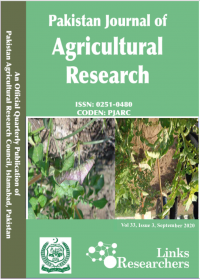Experimental Testing of an Indigenous Solar Driven Desiccant Cooling System for Local Conditions of Pakistan
Experimental Testing of an Indigenous Solar Driven Desiccant Cooling System for Local Conditions of Pakistan
Shujaa Arshad1, Muhammad Umair1*, Rana Shahzad Noor1, Chaudhry Arslan2, Arslan Afzal1 and Zafar Islam3
ABSTRACT
Demand for space cooling is increasing with a rapidly growing population. Cooling is not only required for comfort life but also needed to store food and medicine. Cooling needs are fulfilled with conventional cooling systems that use huge electric power and also these systems are not environment friendly. Therefore, it is needed to use alternate energy sources for cooling systems with environmentally friendly technologies. In this research, a small scale solar-driven desiccant cooling system was developed with 3 feet length, 2 feet width and 2 feet height and tested for local environmental conditions of Pakistan. Pakistan has blessed with an abundance of solar energy in most parts of the country and desiccant cooling technology in an environment as well as user-friendly technology. The objective of this study was to test the developed system for local conditions of Pakistan so that this technology can be promoted to be used in agriculture for control sheds/greenhouses for cooling demands using solar energy. The system was developed using local materials and was installed to cool a small room. Parameters such as temperature and humidity were recorded for room and ambient environment. The results showed that prototype help to keep the room temperature up to 4 °C to 5 °C lower than the ambient temperature while using the only solar energy through PV panel. The use of solar energy with new technologies in Pakistan is not yet adopted on large scale. This research will promote the researcher and user to adopt such technologies as Pakistan has great potential to harvest solar energy.
To share on other social networks, click on any share button. What are these?






